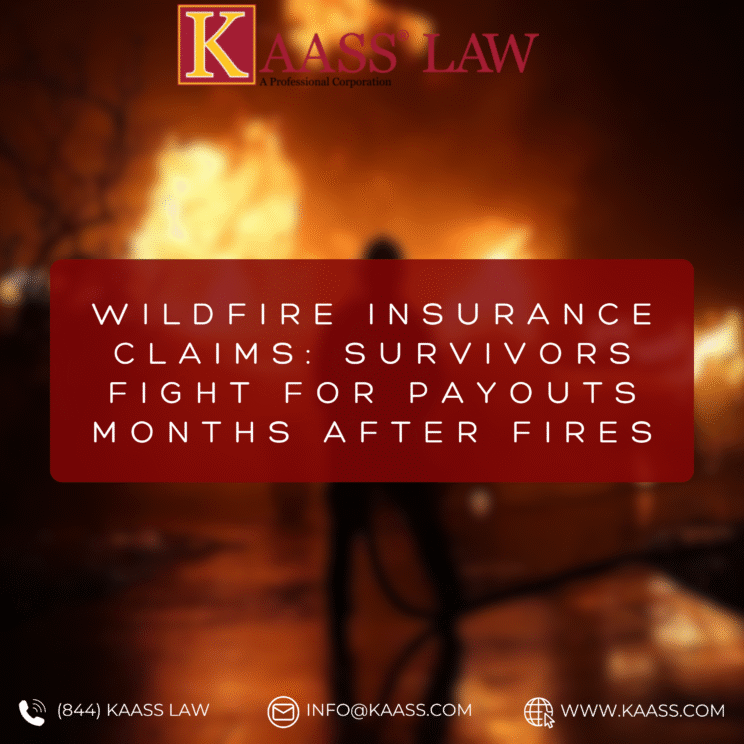Eight months after the destructive Eaton and Woolsey fires scorched parts of Los Angeles County, many victims are facing a second disaster: fighting their own insurance companies. This week, frustrated homeowners from the Eaton Fire Survivors Network gathered in Altadena with state and local leaders. They publicly called on California’s Insurance Commissioner to take action against insurers who have delayed and denied their claims. This event highlights a growing crisis for victims of California wildfires and puts a spotlight on the difficulties of navigating complex Wildfire Insurance Claims.
When you pay your premiums, you expect your insurance company to be there for you after a catastrophe. But what happens when they aren’t? This article will explore the challenges survivors are facing and explain your legal rights when an insurer fails to act in good faith.
The Survivors’ Struggle: Delays and Underpayments
The homeowners in the Eaton Fire Survivors Network tell a story that is tragically common after a major wildfire. Eight months after losing their homes, many are still living in temporary housing, fighting for the money they need to rebuild. They report that their insurance companies are:
- Unreasonably delaying payments for their claims.
- Unfairly denying coverage for items that should be included in their policy.
- Disputing the actual cost to rebuild a home in today’s expensive construction market.
- Prematurely cutting off “Additional Living Expenses” (ALE), which are meant to cover the cost of rent while a home is being rebuilt.
These tactics leave families in a state of financial and emotional limbo, unable to move forward with their lives.
Why Are Wildfire Insurance Claims So Difficult?
After a disaster, insurance companies face a massive number of claims at once. While this can cause some logistical delays, survivors often face more systemic problems. These can include:
- Underinsurance: Many homeowners discover too late that their policy limits are not high enough to cover the full cost of rebuilding their home, a problem that their insurance agent may have never properly explained.
- Demands for Excessive Documentation: Insurers may demand a detailed inventory of every single item lost in the fire, a re-traumatizing and nearly impossible task for a family that has lost everything.
- Disputes with Adjusters: Lowball offers from insurance adjusters who may not understand local construction costs.
Your Legal Rights: Understanding Insurance Bad Faith
When an insurance company’s actions go from a simple dispute to unreasonable and intentional misconduct, it may be acting in “bad faith.” In California, every insurance policy has an implied “covenant of good faith and fair dealing.” This means your insurer has a legal duty to treat you fairly and not to unreasonably withhold the benefits of your policy.
Examples of insurance bad faith include:
- Denying a claim without a valid reason.
- Failing to conduct a thorough and timely investigation.
- Unreasonably delaying payments.
- Not making a reasonable settlement offer when liability is clear.
- Misrepresenting the terms of the policy to the policyholder.
When an insurer acts in bad faith, a homeowner may be able to sue them not just for the original policy benefits, but also for other damages caused by the insurer’s misconduct, such as emotional distress and, in some cases, punitive damages.
Steps to Take When Your Insurer Isn’t Paying
If you are facing unreasonable delays or denials with your Wildfire Insurance Claims, you have several options:
- Document All Communication: Keep a detailed log of every phone call, email, and letter with your insurance company. Note the date, time, and who you spoke to.
- File a Complaint: You can file an official complaint against your insurance company with the California Department of Insurance. This will trigger a formal review by the state agency.
- Consult an Attorney: An experienced attorney can help you understand your rights and determine if your insurer is acting in bad faith. According to resources from CalOES (California Governor’s Office of Emergency Services), navigating the recovery process after a disaster is complex and understanding all available resources is key.
How KAASS LAW Can Help
While our firm focuses on representing victims of Personal Injury, the harm caused by an insurance company’s bad faith actions can be a very real and significant injury. An insurer’s refusal to pay a valid claim can cause severe financial hardship and emotional distress, which can be grounds for a lawsuit.
At KAASS LAW, we are dedicated to holding powerful entities accountable. We can help you assess your situation and understand your legal options. If you are in a dispute with your insurance company, please Contact Us for a confidential consultation.
Conclusion
The ongoing struggle of the Eaton Fire survivors is a powerful reminder that for victims of a disaster, the fire itself is often just the beginning of the battle. Navigating Wildfire Insurance Claims can be a difficult and frustrating process. However, it is important for homeowners to remember that they have rights. The law requires insurance companies to act in good faith. When they don’t, legal options are available to hold them accountable and secure the benefits you need to rebuild your life.

